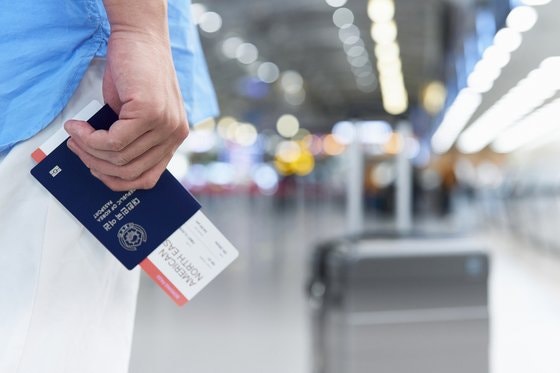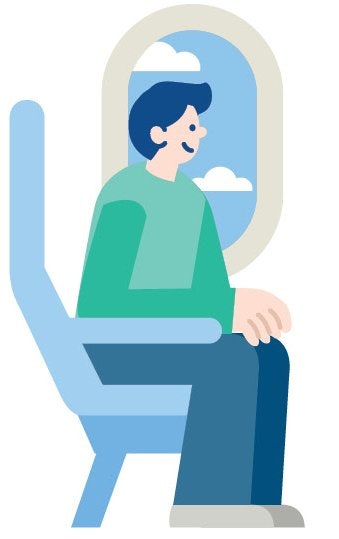No need to bring the English prescription for the medication you are taking.
Avoid food and beverages with marijuana leaf patterns.
Fever and diarrhea after returning to Korea: be sure to visit the hospital

Many people are planning summer vacations, holidays, and overseas trips. In the excitement of searching for tourist spots and popular restaurants, taking care of health often gets pushed aside. However, neglecting the importance of health management can ruin the trip with illness or cause post-travel health issues after returning home. To ensure a safe and enjoyable holiday, here are some things to know before, during, and after international travel.
Before the trip
Infection prevention vaccination at least 2 weeks prior
The first step to a healthy overseas trip is gathering information about the destination. Check for infectious diseases to be aware of in each area you plan to visit, and if vaccinations are necessary, get them at least two weeks before departure.
According to a travel agency survey, the popular overseas travel destinations this summer are Southeast Asian countries such as Vietnam and Thailand. In these countries, mosquito-borne infectious diseases, particularly dengue fever, are rapidly increasing and require caution. The virus transmitted by the Aedes mosquito has an incubation period of 5 to 7 days and causes symptoms such as high fever, headache, muscle pain, and skin rashes. Currently, there are no effective vaccines or treatments, so when traveling to dengue fever endemic areas, it is important to bring insect repellents. It is also advisable to check whether accommodations have mosquito screens or mosquito nets when making reservations.
Carefully prepare an emergency kit before traveling. This includes fever reducers, painkillers, anti-inflammatory drugs, and digestive aids. Also, pack antiseptic disinfectants, ointments, and bandages in case of injuries such as falls or scratches. Professor Kim Ho-jung of the Emergency Medicine Department at Soonchunhyang University Bucheon Hospital said, "If you are already taking prescribed medication, it is advisable to get a doctor's signature and obtain a medical certificate to verify that it is a personal necessity medication before carrying it." To prepare for delayed luggage arrival or lost belongings, bringing a doctor's prescription written in English can help in obtaining medication locally.
If you purchase travel insurance, you can prevent unexpected medical expenses. At this time, you should check whether international transfer coverage is included and how long the coverage period for local stay is.
Learn behavioral tips to prevent jet lag before traveling. Jet lag is a phenomenon caused by a mismatch between the body's internal clock and the local time at the travel destination, resulting in symptoms such as sleep disturbances, decreased concentration, and loss of appetite. It usually occurs when traveling to regions with a time difference of six hours or more. Adjusting your sleep schedule 2 to 3 days before departure can help prevent it. If traveling eastward to places like the United States or Canada, go to bed one hour earlier than usual; if traveling westward to Europe, go to bed one hour later.
While traveling
Check the English name when purchasing food.
Once you arrive at your destination, it is important to minimize the risk of exposure to harmful bacteria. Before eating, always wash your hands with soap or use hand sanitizer containing more than 60% alcohol. Drink boiled water or bottled water, and avoid consuming ice that is likely made from tap water. Also, refrain from eating fruits and vegetables that you have not peeled yourself.
Many people stop by local supermarkets to buy foods that can only be tasted in that country. In this case, you need to carefully examine the product's surface. In some U.S. states, Canada, Thailand, and other countries where marijuana is legalized, food and beverages containing related ingredients are openly sold in the market. The types include cookies, drinks, gummies, and alcohol, among others.
![태국 마트에서 판매 중인 대마 음료수(맨 왼쪽). [사진 국정원]](https://imgnews.pstatic.net/image/025/2024/07/15/0003373315_002_20240715061114516.jpg?type=w647)
Especially in Thailand, cannabis drinks are displayed alongside common beverages that children seek. Soju labeled only in Thai with the phrase "contains cannabis" is also sold. The National Intelligence Service warns, "If you eat it carelessly, you could end up in the hospital or become involved in a crime," and emphasizes, "When purchasing food and beverages, you should check for leaf patterns symbolizing cannabis and English names such as cannabis, marijuana, or weed."
Additionally, be cautious of mosquito-borne infectious diseases. When engaging in outdoor activities, apply mosquito repellent and wear long-sleeved, light-colored clothing. If staying in a room without window screens, it is safer to use a mosquito net treated with insecticide. Contact with wild animals should also be avoided; if bitten or scratched by an animal, immediately wash the wound with soap and water and seek medical attention at a hospital.
After the trip
Even if you're sleepy, take a nap for less than 30 minutes.
Many people suffer from post-vacation symptoms such as fatigue, indigestion, and decreased concentration after their trip. This is a result of changes in lifestyle patterns during the vacation period. Especially during international travel, there is a high likelihood of disrupting the biological rhythm due to a packed schedule or irregular sleep patterns.
Receiving sunlight during the daytime can help restore your circadian rhythm after returning to your home country. Aim to get sunlight for about 20 minutes a day through activities like walking. Even if you feel sleepy during the day due to jet lag, it is important not to sleep excessively. According to the Korean Society of Sleep Medicine, if you must nap during the day due to jet lag, a nap of less than 30 minutes taken at least 8 hours before your scheduled bedtime is appropriate.
Professor Seong Won-jae of the Department of Neurology at Hanyang University Hospital explained, "There is also a method of adjusting the sleep cycle by taking melatonin or fast-acting sedatives," and added, "Staying awake during the daytime and sleeping at night on the plane before returning to Korea can also help with jet lag adaptation after returning."
It is advisable to closely monitor your health for a period after returning home. If within a week of returning to Korea you experience fever, diarrhea, vomiting, jaundice, abnormal urination, or skin conditions, visit a nearby medical facility, disclose your recent travel history abroad, and receive medical care. Before visiting a hospital, you can also receive guidance on how to handle your symptoms by contacting the Disease Control and Prevention Agency Call Center (1339). In the case of malaria, a mosquito-borne infectious disease, symptoms may appear after an incubation period of 6 to 12 months, so long-term vigilance is necessary.
Travel condition depends! In-flight health management tips

1. Replenish fluids regularly
The humidity inside an airplane is usually maintained at 10-20%. This is significantly lower than the humidity level (40-60%) that people generally find comfortable. As a result, the skin, eyes, and nasal mucous membranes can become dry, leading to discomfort. To prevent dryness, it is recommended to drink water frequently to stay hydrated, while avoiding alcohol, coffee, and black tea, which have diuretic effects. It is better to wear glasses rather than contact lenses, and if you experience discomfort from dry eyes, prepare artificial tears and use them intermittently. Moisturizers and water sprays that keep the skin moist are also helpful.
Avoid tight clothing around the abdomen
Changes in cabin pressure during a flight can cause various discomforts. You may experience abdominal bloating or pain due to intestinal gas expansion, and your ears may become muffled or less responsive. Sudden tooth pain can also occur. To minimize discomfort, avoid wearing tight clothing around the abdomen and refrain from consuming carbonated drinks during the flight. Chewing gum or swallowing during takeoff and landing can help prevent ear congestion. Since barometric tooth pain is more common in individuals with cavities or periodontal disease, it is also recommended to have a dental check-up before traveling.
3. Practicing the 20-20-20 rule
Spending about 10 hours on a plane can easily lead to boredom. Watching videos is a way to alleviate boredom. However, staring at a bright screen for a long time in a dark environment can increase eye fatigue. Take breaks from your smart device or seat monitor and practice the '20-20-20 rule' to rest your eyes. This involves looking at something 20 feet (about 6 meters) away for 20 seconds every 20 minutes.
4. Do not cross your legs and relax your muscles
On airplanes, passengers remain in a stationary position for long periods. As a result, blood flow in the deep veins of the legs can become sluggish, increasing the risk of deep vein thrombosis (DVT), which involves the formation of blood clots. Symptoms mainly include swelling and numbness in the legs, and if it worsens into pulmonary embolism, it can be life-threatening. Professor Byun Jae-ho of the Department of Cardiovascular Medicine at Incheon St. Mary's Hospital, Catholic University, advises, "For prevention, it is good to change your posture frequently, do stretching or massage to loosen the leg muscles," and "simple movements like moving your ankles or lifting and lowering your heels while sitting can also help." It is also beneficial to avoid crossing your legs and to stand up frequently to walk along the cabin aisle.